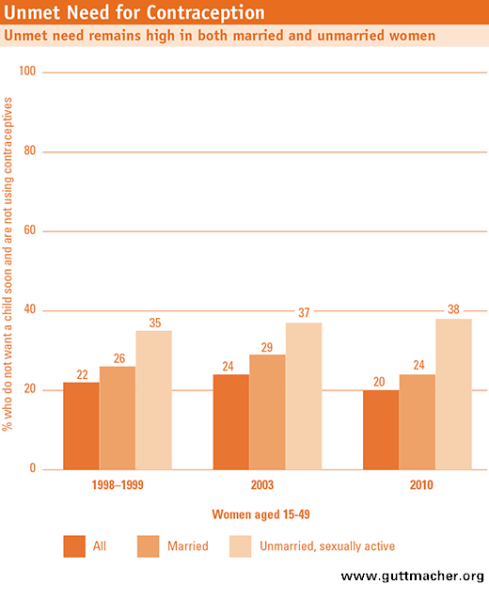An estimated 105,000 abortions occurred in Burkina Faso in 2012, the vast majority of which were clandestine procedures performed under unsafe conditions that jeopardize Burkinabe women’s health and lives. The finding comes in a new report, Unintended Pregnancy and Abortion in Burkina Faso: Causes and Consequences, released today by the Institut Supérieur des Sciences de la Population (ISSP) of the University of Ouagadougou and the U.S.-based Guttmacher Institute. According to the report, 43% of women who had an unsafe abortion experienced complications serious enough to require treatment, but many women did not receive the medical care they needed.
The researchers found that a woman’s socioeconomic status largely determines the type of abortion provider she will use, and thus how safe her procedure will be. The level of risk was greatest for poor rural women, an estimated 72% of whom go to traditional practitioners with no medical training or attempt to end their pregnancy themselves using dangerous methods such as potions, high doses of drugs or products including bleach and laundry soap. In sharp contrast, 74% of better-off urban women use trained medical professionals including doctors (26%), trained health workers (25%) and midwives or other trained birth attendants (23%).
"Not surprisingly, we found that poor women living in rural areas are the most likely to be injured, sometimes gravely, as a result of a clandestine abortion. These women are also the least likely to receive the medical care they need to treat their injuries," said Dr. Clémentine Rossier, co-author of the report and researcher at ISSP at the time the study was conducted.
Approximately 46% of poor rural women who had an abortion experienced complications and 41% of these complications went untreated. The situation for nonpoor urban women was markedly different—23% experienced complications and more than 90% of these women received the medical care they needed.
While rural women are more likely to suffer complications from an unsafe abortion than are urban women, they are less likely to have an abortion. In rural zones, the overall abortion rate is 22 per 1,000 women aged 15–49, while in urban zones, it is 34 per 1,000. Abortion is especially common among urban women who are young, unmarried and have completed secondary school.
However, regardless of where they live, the vast majority of women decide to terminate a pregnancy for the same reason: they are faced with an unintended pregnancy. An estimated 32% of all pregnancies in Burkina Faso are unintended—meaning they are either mistimed or unwanted altogether—and one-third of all unintended pregnancies end in abortion.
This high level of unintended pregnancy is a result of low levels of contraceptive use. Just 15% of married Burkinabe women use a modern contraceptive method. In 2010, 24% of married women of childbearing age reported that they did not want a child (or another child) soon or ever; however, they were not using any contraceptive method. Among young, sexually active unmarried women, 40% had an unmet need for contraception.

"Family planning programs need to be strengthened so that all women can more easily plan the timing and spacing of their pregnancies. This will reduce unintended pregnancy, and thereby the need for abortion," noted Dr. Akinrinola Bankole of the Guttmacher Institute. "At the same time, improving access to high-quality postabortion care services, especially in rural areas, is critically needed to reduce maternal illness and death in Burkina Faso."
The study also recommends that efforts be made to increase awareness of Burkina Faso’s abortion law among women, communities and health professionals to ensure that Burkinabe women who are eligible for a legal abortion can access safe services. Abortion in Burkina Faso is legally permitted to save the life or protect the health of the woman, or in cases of rape, incest and fetal impairment, yet knowledge of the law is low.